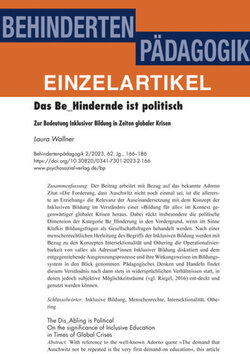21 Seiten, PDF-E-Book
Erschienen: Mai 2023
Bestell-Nr.: 23555
https://doi.org/10.30820/0341-7301-2023-2-166
abonnieren
Laura Wallner
Das Be_Hindernde ist politisch (PDF)
Zur Bedeutung Inklusiver Bildung in Zeiten globaler Krisen
Sofortdownload
Dies ist ein E-Book. Unsere E-Books sind mit einem personalisierten Wasserzeichen versehen,
jedoch frei von weiteren technischen Schutzmaßnahmen (»DRM«).
Erfahren Sie hier mehr zu den Datei-Formaten.
Der Beitrag arbeitet mit Bezug auf das bekannte Adorno Zitat »Die Forderung, dass Auschwitz nicht noch einmal sei, ist die allererste an Erziehung« die Relevanz der Auseinandersetzung mit dem Konzept der Inklusiven Bildung im Verständnis einer »Bildung für alle« im Kontext gegenwärtiger globaler Krisen heraus. Dabei rückt insbesondere die politische Dimension der Kategorie Be_Hinderung in den Vordergrund, wenn im Sinne Klafkis Bildungsfragen als Gesellschaftsfragen behandelt werden. Nach einer menschenrechtlichen Herleitung des Begriffs der Inklusiven Bildung werden mit Bezug zu den Konzepten Intersektionalität und Othering die Operationalisierbarkeit von »alle« als Adressat*innen Inklusiver Bildung diskutiert und dem entgegenstehende Ausgrenzungsprozesse und ihre Wirkungsweisen im Bildungssystem in den Blick genommen. Pädagogisches Denken und Handeln findet diesem Verständnis nach dann stets in widersprüchlichen Verhältnissen statt, in denen jedoch subjektive Möglichkeitsräume (vgl. Riegel, 2016) ent-deckt und genutzt werden können.
Abstract:
With reference to the well-known Adorno quote »The demand that Auschwitz not be repeated is the very first demand on education«, this article elaborates on the relevance of dealing with the concept of inclusive education in the understanding of an »education for all« in the context of current global crises. In particular, the political dimension of the category of disability comes to the fore when, in Klafki’s sense, questions of education are treated as questions of society. After a human rights derivation of the concept of inclusive education, the operationalisability of »all« as addressees of inclusive education is discussed with reference to the concepts of intersectionality and othering, and opposing processes of exclusion and their modes of action in the education system are examined. According to this understanding, pedagogical thinking and action always takes place in contradictory circumstances, in which, however, subjective spaces of possibility (cf. Riegel, 2016) can be discovered and used.
Abstract:
With reference to the well-known Adorno quote »The demand that Auschwitz not be repeated is the very first demand on education«, this article elaborates on the relevance of dealing with the concept of inclusive education in the understanding of an »education for all« in the context of current global crises. In particular, the political dimension of the category of disability comes to the fore when, in Klafki’s sense, questions of education are treated as questions of society. After a human rights derivation of the concept of inclusive education, the operationalisability of »all« as addressees of inclusive education is discussed with reference to the concepts of intersectionality and othering, and opposing processes of exclusion and their modes of action in the education system are examined. According to this understanding, pedagogical thinking and action always takes place in contradictory circumstances, in which, however, subjective spaces of possibility (cf. Riegel, 2016) can be discovered and used.
Erik WeberS. 115–117Editorial (PDF)
Anne-Dore SteinS. 119–122Initiative: Einsetzung einer Enquete-Kommission Gesellschaftliche Inklusion des Deutschen Bundestages (PDF)
Sabine SchäperS. 123–139Machtstrukturen - Wissensordnungen - Subjektivierungsweisen (PDF)
Sichtbaren und unsichtbaren Mechanismen der »Regierung« von Behinderung und Benachteiligung auf der SpurCaren Keeley & Timo Dins S. 141–165Kommunizieren (in) der Krise (PDF)
Ergebnisse aus dem Forschungsprojekt ComCri zu den Herausforderungen und Möglichkeiten der Erschließung gesundheitsbezogener Informationen bei Menschen mit komplexen BehinderungenLaura WallnerS. 166–186Das Be_Hindernde ist politisch (PDF)
Zur Bedeutung Inklusiver Bildung in Zeiten globaler KrisenWiebke FalkS. 187–189Rezension von: Gisela Kubon-Gilke & Anne-Dore Stein (2022): Annäherung an eine neue Aufklärung (PDF)
Stefan KlingsS. 190Behindertenpädagogik in Hessen (PDF)
Schwerpunktthema: Unterrichtsplanung im Förderschwerpunkt SehenElisa WeberS. 191–198Begründung eines Sportund Bewegungsunterrichts für Schüler_innen mit dem Förderschwerpunkt Sehen und theoretische Planungsgrundlagen für den Unterricht (PDF)
Laura Villalba y WeinbergS. 199–204Rezension von: Cristina Morales (2022): Leichte Sprache (PDF)
Karl Ludwig RabeS. 205–210Aus der Verbandsarbeit (PDF)
Anne-Dore SteinS. 119–122Initiative: Einsetzung einer Enquete-Kommission Gesellschaftliche Inklusion des Deutschen Bundestages (PDF)
Sabine SchäperS. 123–139Machtstrukturen - Wissensordnungen - Subjektivierungsweisen (PDF)
Sichtbaren und unsichtbaren Mechanismen der »Regierung« von Behinderung und Benachteiligung auf der SpurCaren Keeley & Timo Dins S. 141–165Kommunizieren (in) der Krise (PDF)
Ergebnisse aus dem Forschungsprojekt ComCri zu den Herausforderungen und Möglichkeiten der Erschließung gesundheitsbezogener Informationen bei Menschen mit komplexen BehinderungenLaura WallnerS. 166–186Das Be_Hindernde ist politisch (PDF)
Zur Bedeutung Inklusiver Bildung in Zeiten globaler KrisenWiebke FalkS. 187–189Rezension von: Gisela Kubon-Gilke & Anne-Dore Stein (2022): Annäherung an eine neue Aufklärung (PDF)
Stefan KlingsS. 190Behindertenpädagogik in Hessen (PDF)
Schwerpunktthema: Unterrichtsplanung im Förderschwerpunkt SehenElisa WeberS. 191–198Begründung eines Sportund Bewegungsunterrichts für Schüler_innen mit dem Förderschwerpunkt Sehen und theoretische Planungsgrundlagen für den Unterricht (PDF)
Laura Villalba y WeinbergS. 199–204Rezension von: Cristina Morales (2022): Leichte Sprache (PDF)
Karl Ludwig RabeS. 205–210Aus der Verbandsarbeit (PDF)

